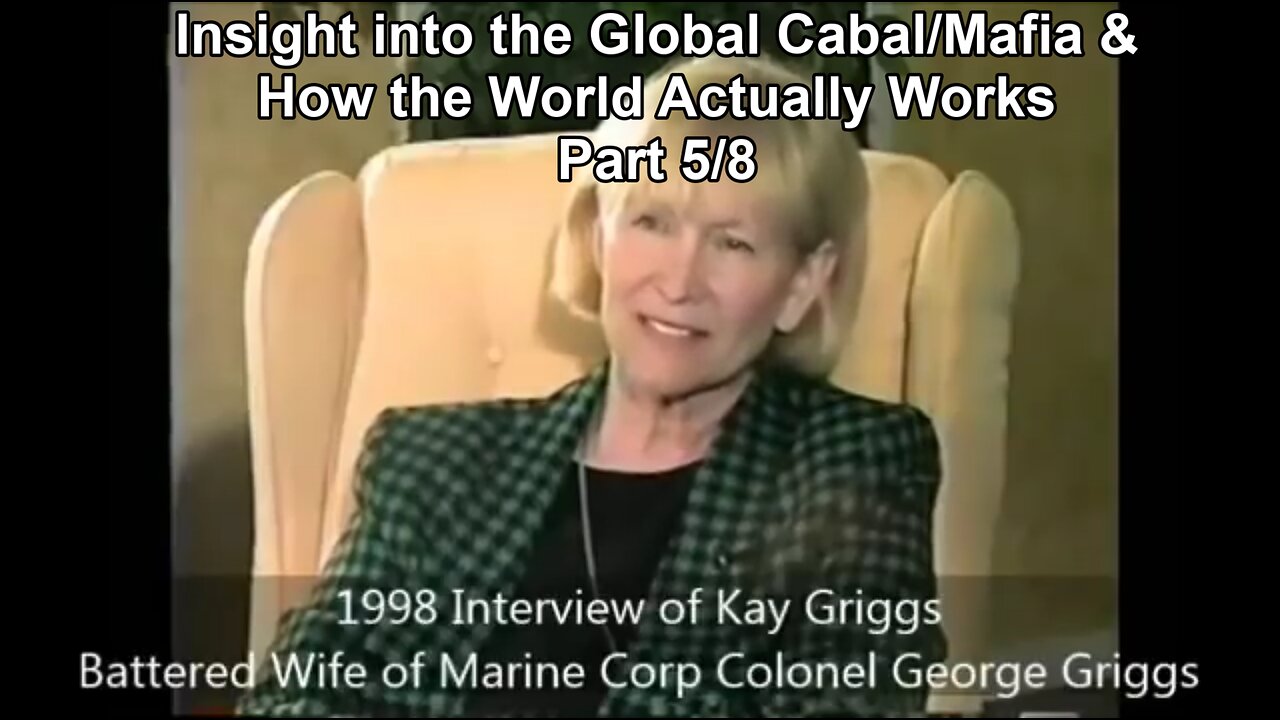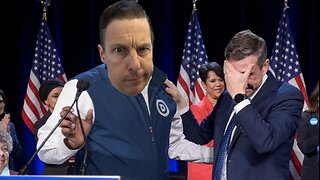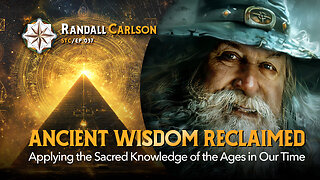Premium Only Content

The Kay Griggs Interviews, Part 5/8 - Disclosure of the Global Cabal/Mafia (Timestamped)
The Kay Griggs Interviews, 1988, Part 5/8 - Disclosure of the Global Cabal/Mafia (Timestamped)
This series of interviews is probably one of the most important pieces of modern disclosure that's public into how the world actually works. Many of the "heroes" and celebrities of the "alternative media" sphere that are highly platformed (e.g. Whitney Webb, Alex Jones, Ian Carroll -- among others), will not talk about this interview although they know of it.
In Webb's case, and I'm just using her as an example, she's from a wealthy "cabal" connected family and is a trust funder. Her publisher is Mint Pres which is tied to Chatham House/The Royal Institute of International Affairs, the policy arm of the Committee of 300. You'll get good info from her, but it's allowed info.
Summary
(00:01-01:04) The speaker recounts unusual events in her home linked to Navy SEAL training exercises, including missing personal items and odd rearrangements that left her feeling paranoid and confused.
(01:34-03:50) She shares her traumatic experiences related to her marriage, hinting at domestic abuse and her husband's psychological issues stemming from his military background, while expressing a deep commitment to her marriage vows despite the turmoil.
(03:50-06:30) After multiple reported break-ins, she describes interactions with law enforcement and the FBI, discovering that the officers sent to help her have military backgrounds, which leads her to question their ability to truly assist in her situation.
(08:34-11:00) The conversation shifts to historical perspectives on U.S. military and political involvement, with specific reference to figures such as Walt Whitman Rostow and their alleged roles in the Vietnam War and broader conflicts, demonstrating a deep distrust of government motives.
(30:23-33:19) The speaker discusses her husband's lack of morality regarding murder, confirmed through his casual admission about participating in assassinations, specifically referencing the murder of Malcolm Kerr, a British double agent.
(39:37-43:47) Concerns about the composition and bias within the U.S. State Department are raised, particularly regarding its handling of Middle Eastern affairs and the perceived favoritism towards Israel, highlighting a lack of balance in political representation.
(55:08-57:54) The narrative circles back to historical figures in military and intelligence circles, illustrating perceived connections between personal relationships, assassinations, and how these networks operate, suggesting deep-seated issues of corruption and moral depravity linked to her husband's past and broader political conspiracies.
Transcript:
(00:01) The emerging SEAL group. Oh, I see. The budding SEALs. Budding SEALs. I see. And they have to break into houses. Their training exercise is to break into civilians' houses. For practice. For practice. They broke into my house. When George and I were first married, I had many, many, many underwear. You know, this is terrible to say, but lingerie. I had lots of, you know, I didn't buy much, but it all disappeared.
(00:35) And then when the psyching was beginning, I had white blouses, but they would all have black dots on them. I'd say, George, here's another blouse with a black dot. It was just a little message? This was somebody's message, you know. Or I would, after George left, it was batteries in a drawer. You know, you can't tell the police I opened up a drawer where I had six batteries and now I've got 50 batteries.
(01:04) They're going to say, well, of course you're crazy. And I started my little sob with a screwdriver. And, you know, I was always looking around for screwdrivers. One day I come home and there are about 12 screwdrivers on the table, you know, neatly placed. Well, you can't call the police and say, I've got 12 screwdrivers, you know. You can't tell people that you've got black dots on all your white blouses.
(01:34) You know, your shoes are disappearing. And, man, this is really, I called the police the first break-in, which was the night of March the 4th, the night before I went to see General Joy at the Marriott. Well, I had already called the police when I was battered because I was just bruised. I made O.J.'s wife look like Marilyn Monroe. I mean, you talk about. And I was doing this because I thought it would help him, you know, have 45s put to my head.
(02:05) And he's laughing. He'd strangle me and put his finger on my juggler vein. And he'd just say, now don't you dare move, you know. I mean, or I'd be lying in bed and he'd do a jab where he'd just push me off the bed. You can't believe what horror I went through to try and get this man to understand what Christ's love is about. You know, people say, oh, well, you should have left. Well, I took my marriage vow seriously.
(02:32) I knew he was injured psychologically by the war, by whatever he was made to do. So, I mean, I'm fine. I just sacrificed a lot. I was in a big wrestling match with a crazy guy, you know. But I still love the little boy within. He's very troubled. But anyway, I called the police after a number of little break-ins. And guess what? The policeman they sent was a little short guy with a short haircut whose name was Shorty Satterwhite.
(03:13) And Shorty Satterwhite was saying, oh, now, Ms. Griggs, now you're just making this up. Now, you know Ms. Griggs. You're just traumatized. Your husband's gone, blah, blah, blah. I found out he was a 20-year Marine. And not only that, but there's another part of his life. But that's okay. I mean, he's a nice guy. But he was a Marine. And he takes orders. Of course he does. He's still reserved. So I think, okay, I'll call the FBI.
(03:50) You know, I'll let them know what's going on. I heard about the FISA court and that, you know, because I'm talking about William Colby, maybe they think I'm a threat because I know all these international people. So I'm just going to call them and tell them what's going on. So I call Torrance, who's the head of the FBI. And he's too busy, you know, too busy. So he sends this guy, Dan McNally, out. And Dan McNally is a very nice guy.
(04:22) And he has this girl interview me, and I type out something about George's history and what I know. Guess who else is a 20-year Marine? Dan McNally. And it just so happens that Dan McNally's best friend, and he's not married either, but that's all right, his best friend, who is from North Carolina and never married, is a best friend of Fred Hentz, who's the one who took me to this place, Mahi Maz, where I had the two death threats,
(05:06) who was graduated from college in 59. He was intelligence. His father was a German high, part of the Kaiser's elite group. He was NATO colonel, which I thought was pretty neat, and that's why they knew the profile. Kay likes NATO people because she's going to learn a little bit about another culture. And I'm not saying that because his family were high command, but he was also an existentialist. Okay, and again, for our viewers that may not know the term existentialist, you mean?
(05:56) An existentialist, according to my husband, which he is one, Fred Hentz, all of these people are existentialists, they believe in doing whatever it takes. It doesn't matter what the law says. They will do anything necessary to get what they want politically and economically and whatever. In other words, killing a leader, killing five people, killing 20 people, according to George, is a lot better than war.
(06:30) This is the way they rationalize it. You didn't used to kill women and children in war. When the British Army, when they were pure, kind of, you know, you didn't go out and kill. I think Dresden, they did do some of that, but that was Walt Whitman Rostow and his crowd. And he's a very dangerous man because Walt Whitman Rostow is a communist. Okay, and in what capacity is he? Oh, he was one of the wise men in Kennedy's administration.
(07:06) I think he was probably responsible for the movement that got Kennedy murdered. I believe it was an Israeli group which did it with some of these rogues. Okay, now when you mention wise men, is this an insider term too? Wise men, yeah. Kennedy's wise men were guys like, you know, the Harvard crowd. And he was trying to bring them in to change things around a lot. Walt Whitman Rostow was the one who got us into the Vietnam War because he wanted to sell the weapons and stuff.
(07:49) He and Victor Krulak, who is the present Commandant's father, Krulak was his lackey. Walt Whitman Rostow's lackey. Walt Whitman Rostow went with Taylor, General Taylor, and wrote the report that got us into the Vietnam War. And all the time that the Pentagon was saying no, no, no, no, he was a cheerleader for the weapons sales. He and Henry Kissinger, Heinz. He and Henry. Walt Whitman Rostow, Eugene Debs Rostow, these were communists, named for communists.
(08:34) Eugene Debs Rostow and his, it's either his son or his other brother, runs the big Boston mob, the port there. His name is Nicholas Rostow with the Weld, you know, with William Weld. They've done all that drug business in Mexico for years. They had that Russian, you know, the one who was murdered by the assassin, Ramon. You know, he was a competitor, Stalin's competitor, and he escaped. Very famous. Tolstoy.
(09:18) Tolstoy became a Christian at the end, and you can't become a Christian. That's a death warrant. So they killed Tolstoy because he was becoming too, I think, now I don't, maybe I don't know the whole story. There's probably a lot more to it, and I just, maybe I see completely the wrong picture there. But Tolstoy was murdered by the same Parisian, Spanish, Czechoslovakian, Georgian, Russian group which are all part of the former Abwehr.
(09:56) We've got to stop. Tolstoy is not the correct name. I know who you're talking about, but I can't think of him. Tolstoy is a writer. He's a Russian writer. The guy you're thinking of was murdered in Mexico. It's not Tolstoy. Okay, what was his name? It's a good point to bring this up, because if we can correct that name, and don't go that wide. When I talk about going wide, I'm not talking about going anywhere near that wide, because we've got all this junk over here we don't want in the picture.
(10:28) Are you sure it wasn't Tolstoy? I think it was. I know he's a writer. I know. It's okay. You're learning. He was a man of Lenin, and he defected and went to Mexico. He went to Mexico and murdered him. I think it was Tolstoy. It could be two Tolstoys. No, Tolstoy is a very famous artist. You're not thinking of Trotsky? Oh yes, you're right. Oh, got it, got it. Let's correct that. Oh, thank you, thank you. Bravo.
(11:00) We're getting close. You were doing so well, and I thought we can't use this because it's the wrong name, and it's going to disrupt the whole story. Good, good. Trotsky. Let's back up. Okay. We have five minutes to go. Okay. We can easily do that. That is on this tape. We have more time than this, but on this tape. On this tape, and in the next five minutes, tell us what Mack Sugg means, because you mentioned it earlier.
(11:28) I still don't know what it means. Let's get Trotsky in this piece right now while we're thinking about this. Okay. So let's pick this up with ... You were saying about ... We were talking about the Wiseman, we were talking about the Rostos, and ... William Weld, and Mexico, and the involvement of the Mexican government. And it's not Tolstoy, it's Trotsky. Okay, hold on a second. I won't even necessarily mention that, because that will be completely clipped and edited.
(12:00) So just go ahead and tell the whole story, but use the name Trotsky. All right. Go ahead. Here we go. This group, which was run out of Paris, is still being run out of Paris. This revolutionary terrorist group, which is controlling these Marines and Army Steiner's group, they all operate together. The man who started all of this program during Vietnam used communists who were in the Spanish communist movement.
(12:42) They actually promoted communists in the OSS, which was started by this William, anyway, Donovan. So they were promoting and using communists who were actually wanting to get rid of our form of government as a stepping stone to world domination. So this group now, in the Army and in the Marine Corps, has communists at the very top, who are really existentialists, which means they don't believe in God. They don't believe in Christ.
(13:22) They live for the moment. They believe in sort of one world, which has no religions in it. They're the ones who put Napoleon in power. They're the ones who put Oliver Cromwell in power. They're the ones, probably, who actually were behind the Roman Empire and maybe the Egyptian Empire. They put puppet people in power, and they actually run it from behind the scenes. Now, Trotsky, as I understand it, was escaped from Russia.
(13:57) He had become a Christian, I understand, and was working with agents in the United States, Israel. And he was considered a threat, so he had to be silenced, killed. There's an excellent book, which I have, called The Mind of an Assassin, which is about the background of Trotsky's assassin, a young man named Ramon, who was trained. He was Soviet paid. I think he had experience in Spain. They organized it in Paris, I believe.
(14:54) And, of course, up to the present time, there have been assassins operating out of Rome, Milan in particular, Naples, and Paris. And these are all anarchists, all mob-related. They use mob funding and, of course, drug money to pay for the weapons, which are brand new weapons. The Bosnia Bazaar, this is the reason we had the war in Bosnia. The war in Bosnia is simply a stage to train assassins, to be a market for brand new weapons, to be a marketplace so that the drug money can be used.
(15:46) And the army runs the whole show. It's totally run by the army. The CIA is a bogus thing, you know. It's Training and Doctrine Command. It's NATO. It's SHAPE. Supreme Headquarters Allied Powers Europe, started by Eisenhower. It's a totally independent corporation. Its main function is to sell weapons and launder money. You're talking about CIA? No, I'm talking about SHAPE. SHAPE. CIA is kind of bogus. That's just a trade name for the media to use.
(16:24) Oh, it's to confuse us. It's just to get us off the track. It's all being done by army people who are now joint. Because the word joint comes from the group that brought over a lot. And a lot of good people came over. But they came over illegally to kind of escape Nazi Germany and stuff. I don't know that much about it. But I do know that the funding organization, one of the funding organizations, was out of New York.
(16:56) And it was called the Joint. And Meyer Lansky. See, our mob, the organized crime, the Jewish Kabbalist group, who don't believe in God really. Well, they do. They look at God as a Kabbalah kind of thing and the opposite of good is bad. They have to get rid of all the good people and kill them. I mean, they really do this. They're killing people who are good on purpose. And they get brownie points with their little cult.
(17:29) But this funding group in New York, they would pay for passports which were illegal. In fact, my grandfather was involved with that. That's how I know so much about it. Because my grandfather was told to keep silent and not to tell anybody. But, of course, he told my grandmother, and my grandmother told me, and I've told my children. Everybody knows they brought in probably more than 200,000 Nazi soldiers and SS
(18:02) and, you know, wacko scientists and psychologists. And all of them, most of them, had the German disease. You know, because it was their culture. The German disease? Yeah, the German disease is what the Pink Triangle boys were. Colonel Ron Ray writes about this. He's a Marine colonel who's a Christian who's writing about the Cherry Marines, the homosexuality in the group sex orgies and so forth, which brought down the German government because Naples,
(18:39) which is where all of the Navy is doing their playing. I mean, today, in Naples, these orgies are going on. It was where Krupp, the weapons manufacturer, used to take the German high command and they would go on the Isle of Capri into the Blue Grotto. And they would have big orchestras, and they'd bring in little boys, little Italian boys who would be raped. They'd give them trinkets. And, of course, the mothers gradually found out,
(19:16) and just like me, it was wonderful. One thing, when there was just one of me, now there are a lot more of us wives who are talking and telling truth. And it took those Italian women went to newspapers in Italy, they wouldn't listen. But when they went to the wives of these guys in Germany, it brought it all out. It brought the German government down because they were duplicitous in it, you know. But what they were doing was pedophilia.
(19:49) They were raping, bringing in little boys. They involved the Catholic priests, you know, who were bringing in all, anyway, so. But what happened was, this whole group came over to the United States. And they, it's an old culture, but it is the reason there are a lot of things going on with children these days. And it explains why it's all being covered up, because if you've got police officers who are playing these games and they're going in the woods like to, what is this place,
(20:32) they wear, I mean, even Eisenhower played these games. Even Mike Kemp out in, it's called the Hermitage. The Hermitage. In California, where they all run, they get drunk and they run around nude in the woods and stuff. Bohemian Grove. That's it. Bohemian Grove. Okay, rather than Hermitage, it's the Bohemian Grove. Bohemian Grove, that's the name of it. My brain's tired. That's okay. And the one in, there was a big one in Washington called Rush River Lodge, where they used to
(21:06) all go, and there are lots of places now. But the problem, as I see it, is that I think they're trying to destroy America and the basic Protestant Christian culture, because where you have a militaristic society, which is where the rules are only for those people, and keep in mind that Meyer Lansky and Luciano, Lucky Luciano and the other man, they chose to go to Italy. Luciano went to Milan. He didn't, he wasn't banished to Naples and Milan.
(21:55) The two top mob families went there because of the weapons industry. They're selling weapons. I mean, that's what the military is doing. It's totally controlled by the mob. Look at this. Weinberger was General Douglas MacArthur's, he spied on MacArthur in Korea. Who was MacArthur's nemesis, albatross? It was none other than little old intelligence. I'm going to tell every move you make, Weinberger, young, but he did it.
(22:36) He brought down MacArthur. Every move MacArthur was going to make, he broadcast it through the chaplain, his little intelligence network. And he got brownie points with the group because he brought down the big lion. When you get rid of a big lion like that, you get a big job. You've done good work. And they needed to get rid of MacArthur because he didn't want to keep the wars going. He wanted it over and, you know, it's like General Truffaut, who took over after the
(23:12) Vietnam War was over, and he was on C-SPAN in August of 96 with former Ambassador Whitehead and a few of the other, you know, the State Department Vietnam people. And General Truffaut, he had been holding this in for years. He was on C-SPAN. This man let it all out. He said, I took over at the end of the Vietnam War. I was in control, right? Big general charge. So I say, cut off the shipment of weapons. So I tell the Pentagon, cut off the shipment of weapons.
(24:07) He said, I got a phone call from Henry Kissinger saying, the weapons are going to continue at the wartime rate. Sure. Now, that's when all this stuff with China started. Well, it started before then, because already the communist agents, the New York, Brooklyn, New Jersey mob, were already training male. Male was trained in Paris. So was, you know, the one in Cambodia, what's his name? I can't think of his name.
(24:46) The one who was Paul Pott. They were homosexually, bless their little hearts, by priests. They were wonderful little boys, sent there, you know, turned, which is the word, you know, when they believe their mothers and then all of a sudden the world's horrible and then they have these wonderful friends who are going to make them leaders. They're turned psychologically. And it's a pattern. And so this is why it's so important to know what they are doing to innocent little boys
(25:20) in the Army and the Marine Corps today. Why? Why are they having them go together in groups and strip nude when they're brand new inductees? Why do they do certain things in public, in front of the group? Well, they even do that during the pre-induction visit? Yes. And they also have the doctor. That's why I didn't want to go in the Army, I knew there was something. But they also turn around the other way after doing that.
(25:51) The other way and they're upside down. And they do this, anally. Now, why do they do that in public? Why are the urinals all out in public, you know, without separate stalls if they're not promoting this? And then why is it that the ones who are this way rise up faster than the ones who don't? Because there's someone there noticing those who are vulnerable. I was going to say rising, but that wouldn't be quite appropriate.
(26:30) They're called rising stars. Rising stars. That's the word the State Department uses for those who are controlled. And when I was volunteering with the State Department as an escort in Virginia, I had this group called, I thought it up myself, VIVA, Virginia International Visitors Association. And I tried so hard to get to be a part of the State Department family. But, you know, I'm a Christian, see, I'm a Protestant Christian and they don't want Christians
(27:03) in there. My goodness. You know, I would have guests and I would let them know I was a Christian and that I love them and Virginia's a wonderful place. But we, I couldn't be a part of that. They sent me people, but I never was a part of it, even though I had lots and lots of dignitaries. Did you ever have any contact with Madeleine Albright? No, I lived with Sarah McClendon for about six months and Sarah is a Democrat.
(27:55) I was a Republican all these years. I was married for 21 years to a Democratic governor's grandson. It was an arranged marriage and so I knew a lot of the high level Democrats who were really sort of conservative. It's hard, you know, in Virginia, they're very conservative. So when I stayed with Sarah McClendon, I had become a Republican, you know. And Sarah told me a lot of the things that were going on in the White House from her
(28:31) insider perspective, which totally challenged my perspective on everything. You know, Ron Brown was murdered, for example. Vince Foster was murdered. Forstall was murdered. We're going to break right here because we're just about out of tape, I think, on this in here. This would be a good place to pick up, though, Ron Brown, Vince Foster. I think Foster had a Marine Corps background. Is that possible? I think so.
(29:05) He may have. I bet he did. That would fit right in. Oh, yes. Oh, yes. That would fit right in. Because Nussbaum's office was right across the hall. We can pop these tapes out, actually. We're fresh with brand new tapes, the number two ones. Let's take a nice little break. Let's talk a little bit about, your husband would get into these drunken stupors and he would start running his mouth and tell you everything he knew.
(29:42) What did you find was some of the most stunning revelations that came? Besides the fact that he admitted he couldn't be a Christian and was an existentialist and explaining what existentialism meant to him, which was startling to me, the other parts of some of the things he told me, which really startled me and frightened me, was his attitude towards murder, which he said was not murder, because he said emotions are not involved.
(30:23) His cold calculating view of the destruction of innocent human beings, meaning nothing to him. Having absolutely no feelings about ordering others to do that. Now, did he ever carry out some of these murders himself, do you think? Oh, of course. Yeah. In fact, he told me about Malcolm Kerr's murder. Malcolm Kerr. Who's that? Malcolm Kerr was a British double agent who worked in California. He was one of these intelligence operatives who worked for both sides.
(31:06) And he had been in California, but he was doing intelligence work in Beirut undercover. He was the head of the American University of Beirut, AUB, which is in Lebanon. Now, my husband was the liaison between the White House and President Jamal, the second, the brother of the first president who was murdered. My husband was involved with assassinations and operations. He was very upset with Malcolm Kerr, because Malcolm Kerr refused, although they were already
(31:56) there, the Marine snipers, the assassins, who were under my husband and General Joy and Al Gray, of course, were hiding in the dormitory at this university. And of course, General Gray, General Krulak, General Wilhelm, now Charlie Wilhelm was there. He is now my husband's special boss. And they were undercover there. And they had Malcolm Kerr murdered. Only because Malcolm Kerr would not allow the Marines to stay in the dormitory.
(32:40) Had I been Malcolm Kerr, I wouldn't have wanted rowdy Marine assassins living in a dormitory with children, essentially, adolescent, young children, having, you know, with their perversion and some of their behaviors. So he was put away for that very reason, George told me. Then there was Dale Dorman. Did he give you any details about how he was killed? No. He told me that he had to be gotten rid of because of that.
(33:19) He then said that, and oh, this is interesting. Mary Clark Yost Halab is, my husband is handled by her. She is an American double agent who was put on my husband's case because she could handle him. They had an affair, of course, while my husband was first married. I found out about it because she called the house after we were married and wanted to talk to him. And I found in his papers a photograph of her and her bio and all kinds of information
(34:09) on her. And her address in his address book, and I have, I want you all to see that in this movie. I have a photograph of her. They had a long-term affair the whole time he was in Beirut while she was married to an Arab intelligence double agent who was underneath Malcolm Kerr and who took over when Malcolm Kerr was murdered by them. So what you have here is a favor essentially done to Yost. She was Yost.
(34:49) She was from Louisiana. She Baton Rouge, New Orleans. How did she enter the intelligence picture? She recruited from school? Well, yeah, she was at, I'm trying to think. I have her bio. English major, written books on British literature, Phi Beta Kappa. She went to the American University in Beirut. She married an administrator there who became, because of her position, you know, they loved the mixed marriages.
(35:33) He was- Mixed marriage in the sense of? For the double agents. If you marry, if an agent marries an agent- From another country. Yeah. They loved that. The intelligence community loved that. The State Department loved that. And I was mentioning earlier that, about the State Department, when I was living with Sarah McClendon, helping her in 1986, I went everywhere she went because she's the senior national White House correspondent.
(36:10) And I went to the State Department one day because I was curious about why there isn't peace in the Middle East. And I wanted to go to what I thought was the Middle East Department while I, there was a group of students and I got a press pass ostensibly to go in and interview them. So I left them and meandered up to the Near East section. And I had quite a few hours. I thought they were going to, you know, say, what are you doing here?
(36:42) Because all the doors were open. They had these little buttons on each door, you know, that they could have closed and you could have had to have known somebody to get in, which I think is terrible to have the American people not know and not be allowed into the State Department without a special Sarah McClendon. If I hadn't had been living with the senior White House correspondent, I as a citizen would not be welcome at the State Department.
(37:14) Now if they're interested in peace and they're interested in that kind of thing, they're certainly not showing it by the closed door policy. So I went in. There were about, oh, eight or ten offices. I went in every single one. I was looking to find out who the leaders were. I knew about Aaron David Miller. I knew about David Satterfield, who really wasn't David Satterfield. His family were Zionists who changed their name to David Satterfield, who was a Virginian
(37:50) senator back in the 30s who had a wonderful name. It's like Jonathan Pollard. He took the name Pollard, which wasn't his name because of Governor Pollard. I was married to Governor Pollard's grandson for 21 years. They take the names of honorable people and then they're not honorable. And what was his name previous to Senator Pollard? He lived, now Aaron David Miller, I think that is possibly his name. It might have been Mueller.
(38:18) And I'm not saying that just because they changed their name they're bad. But what I am saying is that there is this idea that go ahead and change it and be somebody else. Kind of a snake, you know, changing colors for the moment, not being honorable and truthful, saying my family is Rosinski. Heck, I'd be Rosinski, you know. I'm the eighth Catherine in a row from Scotland. It's ridiculous, but my daughter's Catherine and my granddaughter's Catherine.
(38:44) We're just, you know, it's a family tradition. It's weird, but we're happy with that. So, David Satterfield, the reason I went there was because in the spring I went to a dinner. It was either a dinner or a luncheon that the World Affairs Council had in Norfolk, and he was speaking. And I'm very interested in peace because as a Christian, I want it. I know it's possible if people are reasonable. And this talk that David Satterfield gave, there were probably 20 mentions of Israel to one of the
(39:37) Palestinians. He was extremely biased, arrogant. The arrogance is what bothers me because you can't have peace, you can't have justice, where there's imbalance. And even that comes from the Greek furies, you know, the female who holds the justice. Women understand balance and justice. And women know, mothers know, if you show favoritism towards one child, the other child's not going to be normal the rest of its life.
(40:09) So, a wise mother is fair and tries to be balanced as most families do that are balanced. Well, after having heard the bias and so forth, and then seeing other people who were involved at the State Department in Norway when I was there, when my husband was doing some weapons deals with Newt Igham and some of the State Department people under the table, when we were supposedly going to Moss for the mayor, and her husband and George were doing some deals.
(40:45) He's sort of a pilot and, you know, there's a lot going on between Norfolk, Virginia Beach, and Norway and weapons deals and so forth now because of what they set up in the spring of 95. So, I went into the State Department near east section and found there was not one single Palestinian, not one single Muslim, religious Saudi, you know, Jordanian, not one Christian Protestant, not one Roman Catholic, not one plain old American, whatever, from Corn Pond.
(41:36) Every single person in all of those offices were either Zionist, Israelis, whatever, and they had pictures all over the wall of Israel, Israel, Israel. They had magazines, Israel Today, you know, I was given a copy of one and there were yarmulkes, you know, in the Israeli writing. In other words, and I asked one of the women after having gone through about, you know, four or five of these offices, I said, because I was pretending like I really, you know, wanted, I was just kind of
(42:24) wanting to know where the Palestinian office was, you know. She said, well, we handle all of that. We handle all of that. And this is the State Department, the... Near east, the part that handles Israel, Jordan, all of these. Egypt? Yeah, the Near East section. Yeah. It was just totally dominated by... Totally. Israeli. Totally. And at that time, the spokesman, I can't remember his name, he was a Zionist, the spokesman for the whole State Department.
(42:57) Of course, we know that, and I'm not saying that Madeline Albright is doing a bad job, because I feel as though being a woman, that she is definitely a lot more balanced than Weinberger when he was there, Eagleburger, Schultz, or any of them. Because I feel as if she's trying to do it, but she's not strong enough. There needs to be a fairness in the State Department, because all the weapons sales under the table are going to the State Department. That's why Ron Brown was murdered.
(43:47) Ron Brown tried, for the first time, to take away the unfair State Department monopoly on illegal weapons and drugs, drug deals. Because the weapons, the drug money is paying for the weapons. The brand new weapons are sold by agents of Israel, or this... No, is this a conclusion you've drawn based on your knowledge of this? Yeah. Gorbachev, whatever the guy's name is. Bonifar. Yeah. Gorbachev. Gorbachev, and it was either him or... My husband worked with him.
(44:31) My husband was the one who was Chief of Staff under Al Gray when North was moved from the Atlantic Command to the National Security Council. Ollie North. Ollie North, and when you work in the White House, you work under the Army. The Marines have no overlord as such. They can float, they can be truck drivers, and still be 4th Marine, but they're run out of New Orleans, just like Oswald was.
(44:57) See, Oswald was homosexually recruited by Clay Shaw, David Ferry, that whole, you know, the New Orleans, Meyer Lansky, I mean, I don't mean, well, Meyer Lansky's guy, Jack Rubinstein, who was Jack Ruby. See, all the funding for these operations go through the joint, the mob, and Oswald's mother had moved to New York, and he had gotten under this Zionist psychiatrist. I can't remember his name, but he came down to check on him, and he was brilliant,
(45:47) but he wasn't motivated. He wasn't told he was special, his dad died or whatever, you know, and his father was a, you know, I believe, a German soldier, but the point is, Oswald was a loner, brilliant, and a perfect candidate. He and my husband's profile are just, in fact, they almost look alike, and... You mean their profile in terms of their background, not their physical profiles.
(46:18) Yeah, even their, they look a lot alike, yeah, and what's interesting is... They always allege that he had a double. Well, you see, this is interesting. My husband, when I saw him in June, after his having lived with me that fall, he was different, a different facial, everything, than the man I married. The man I married and the man I saw in June were one and the same. Had a fuller face, the mouth, you know, the mouth was fine, but the man that I was with, and I know that I felt it was not the same person.
(46:57) Now, I don't think he could have gained that much weight in just a few months, because he was very thin and, you know, it... Now, I could be just... But women sense things. I don't know how to explain it, and I talked to a good friend of Marina Oswald's who knows that her husband was a patsy, and I talked to another woman in El Paso who was in the book The Widows, whose husband was a German, or rather a Czechoslovakian, whose father and two brothers
(47:53) had come over here as mercenaries, like all of these young men are still doing today, and the father sent for the little boy and his sister, leaving the mother back in Czechoslovakia. Evidently, she had had an affair or something, but she was banished. I think they do this on purpose, though, because I'm finding that the boys identify with their mothers, they don't bond so much with the fathers, and they are
(48:26) their mother's keeper in that country. Now, I've talked to an Indian who had this situation, a little boy from Haiti, and a young boy from Romania. Each and every scenario was the same. The mothers were back there. They were given five years to become an American citizen. They were mercenaries. They had to do things that made one of them cry on the bus, and he told me what was done when they did a hit. There was one man who did things that were just horrible, and he said, I want to get
(49:05) out, but I can't. And this is horrible, to put young men who are strict Roman Catholics, you know, they've got that background, and bring them over here and make assassins of them, or in other words, to turn them in a five-year period, and for the taxpayers to pay for this. These young men are training with seals. They may have a mother who's an American and a father who's French, so they can go both ways.
(49:40) And therefore, they're not under the laws of the United States, so they can go do the actual murders or whatever. And Oswald, in Oswald's case, if you remember, he was, he didn't have any problem getting into the Soviet Union. And he went into the State Department on a Saturday. The man who saw him was a Zionist. He didn't even meet anybody else. Special, elite. Then he went to this town where there were a lot of, you know, sort of a Zionist intelligence
(50:29) elite group. The Georgian Russians had, because most of the intelligence people for a long time were Zionist in the Soviet Union and in Germany. And I don't know, but I know that they recruited a lot of boys at Eaton and places like that homosexually, in England. And then a lot of them went to the Soviet Union after the doctor's plot or something. I think Stalin thought that the Jewish doctors were after him or something.
(51:06) So in 1952, a lot of them had to go away and they had some sort of a change or whatever. But what's interesting is that a lot of this played into George's, tied into my husband because he was in the place, the mecca for the Jewish intelligence or the Zionist intelligence people in Princeton. All of the movie actors, you know, the movie moguls or whatever, they started out in Princeton. The psychological operations crowd from the Nazi, the whatever, they came to Princeton.
(51:49) Of course, some of them went to Harvard and they spread out from there. Oppenheimer, I mean, you know, it's very interesting. That's where a lot of them were in Princeton. And he was there, of course, well, I mean, he was born in 37. He lived in, born in Atlantic City, then they moved to Lawrenceville. But his grandparents lived outside of Princeton. So he had a tie with his grandparents, but then his grandparents wound up moving out
(52:24) to California. So he was really abandoned from the time he was 13. And of course, being under the influence of Charles Kaddok, who was the bodyguard for the Saudis, al-Ai teacher. And he controlled the power in the school. The Cheeseboro, headmaster Cheeseboro, of course, gave Charles Kaddok carte blanche. Why? Because the Saudis bought a big mansion called Russell House. Kaddok was there with the Saudis all alone.
(53:03) And my husband was there. Part of the time, they would go on outings using Saudi money. I mean, my husband was taught to fly a plane, he was taught to shoot. They went on these, they would get nude and run in the woods kind of thing. Even at Princeton, his roommates told me that he would go out with these men. And when his first roommate said, because he was, he really likes George, and George is a really handsome, I think, little older now, but in those days, he was very handsome.
(53:43) And his roommate of the first two years and who had been at the Han said that he had a relationship with a French teacher who was a count or whatever from Paris, who was kind of a teacher's aide, who helped him write his paper, and who knew Camus. In other words, there was a group, this young French teacher, who liked my husband a lot and helped him with his thesis, was also a friend of an older French teacher who was
(54:21) a very good friend of Camus. And Camus was coming over to see him when he was married. Albert Camus is an existentialist writer who believed in murder and, you know, sabotage. The end justifies any means. Yeah, and he was also an Arabist. They were, you see, Lawrence of Arabia, this group stuff was started by this small group of Kabbalists who were trying to take over the oil. So what they would do would be to find these sheikhs and find whichever one would go along
(55:08) with whatever. Well, the Brits were more interested in finding somebody who was fair, you know, not necessarily like that, you know, but then there was a guy named Moose who was in the American State Department who tried to, they wound up, the Americans wound up poisoning this, Caddick got in with the Saudi royal family, the older, the other brother, who wound up getting it. They had a house in Switzerland, the Saudi royals had a big, you know, big mansions on
(55:47) the, as Les Roses, is the place where Charles Caddick died, I understand. And my husband, according to the roommates, one in particular, who said, George never lost track, he always kept up with Charles Caddick. Well, Charles Caddick only died in, what, 1995, 1994. I only heard of him as a teacher in the first three years of marriage, but when was he writing Charles Caddick? He was writing him, you know, Charles Caddick and, and, and Robinson, Robinson, I can't
(56:37) think of his name now, you probably will tomorrow, Alexander Robinson, Alexander Robinson, was a marine, very handsome, young, went to the Huns school, and was in Saudi Arabia, in these places, came fresh from there to the Huns school, Columbia, went to Columbia University as a history major, which is an intelligence school, Columbia is a school where, you know, for example, Nussbaum went, who was across the hall from Vince Foster, I believe Ezra
(57:21) Pound went there, but in other words, Ezra Pound knew too much, so they just put him in St. Elizabeth's Hospital, and it was a wonderful Virginian who got him out. You know, in the movie JFK, there's a scene where it shows this homosexual, you've seen the movie JFK, okay, well, I presume too much, but there was a scene involving Ferry and, who's the other guy in New Orleans, David Ferry and Clay Shaw, Clay Shaw, Clay Shaw
(57:54) was OSS, he was also in intelligence, and he was homosexual, you know, and,
-
 56:02
56:02
Randi Hipper
1 hour agoBITCOIN AT CRITICAL LEVELS AS MARKET CRASHES! LATEST PRICE UPDATE HERE
17.9K1 -

Matt Kohrs
10 hours agoMARKET CRASH! Trump's Trade War Bloodbath || The MK Show
24.6K6 -
 1:16:40
1:16:40
Graham Allen
3 hours agoCanada WILL LOSE!! Trudeau Enters Trade War With The US! + Zelensky Is Missing 102 BILLION?!
56.6K55 -
 59:17
59:17
Kyle Fortch
2 hours ago $0.15 earnedJon Kilmer: Touring With Kendrick Lamar, Steve Aoki & mike, Creating A Brand | THE ONE SHEET S1E2
3.14K1 -
 38:34
38:34
BonginoReport
5 hours agoTrump Obliterates USAID—the CIA's Piggy Bank (Ep.131) - 02/03/2025
66.6K142 -
 LIVE
LIVE
Wendy Bell Radio
6 hours agoBeware The Wrath Of A Patient Man
12,402 watching -
 1:23:17
1:23:17
Game On!
12 hours ago $0.52 earnedHappy Super Bowl Week! Our Top 10 Super Bowl Props to Bet!
11.9K1 -
 1:32:28
1:32:28
Jeff Ahern
3 hours ago $2.89 earnedMonday Madness with Jeff Ahern (6am pacific)
21.3K -
 LIVE
LIVE
SoniCentric
2 days agoSoothing Autumn River Coffee Shop with Relaxing Jazz
149 watching -
 27:00
27:00
Squaring The Circle, A Randall Carlson Podcast
8 hours agoSPECIAL EPISODE: #037 Randall Carlson Explains The Vital Role of Sacred Geometry in the Modern Age.
14K2